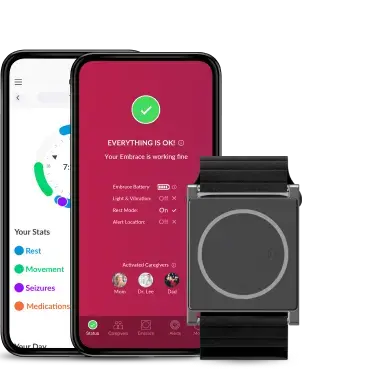Dealing with your seizures at college
Going to college is definitely a big transition in your life, and you’re probably second-guessing and asking yourself a bunch of questions. No doubt, you’re over-the-top excited about this new phase; the opportunities that lie ahead, the prospect of leaving home, meeting new people and making new friends, but still, you have concerns. And for good reasons too. Transitioning to college can be difficult for families and teens living with epilepsy.
Having epilepsy means that you have to take extra care regarding the things you do and how you do them. There's the uncertainty that you could have a seizure at any time. For one, you’re in a new environment: what if no one knows what to do when you have a seizure? You’re no longer under the watchful eyes of your parents or guardians, so how will you get help when you need it?
It is easy to feel weighed down by these thoughts and concerns and feel like you are doing the unthinkable by going off to college, but don’t be! This is a very important step that you have taken, despite having epilepsy. You have decided to be independent, not letting epilepsy stop you, and you should be proud of your decision. Another good thing is that many others have taken the same step that you are about to take and have lived through it, so you are not alone. We are also here to make the experience easier for you.
Here are some basics to get you prepared for college:
- Talk to people around you about your seizures: The key to people understanding is to talk to them about your condition. Many people need to be educated on what epilepsy is and how to help someone that is having a seizure. Your academic advisor needs to know your condition, as well, so that they can help with a choice of courses that won’t be stressful for you. Your residence advisors (RAs) also need to know, as well as your new close friends. You can develop a Seizure Action Plan (as recommended by the Epilepsy Foundation) that they can follow so that they are not caught off-guard.
- Set up an emergency plan with your family: Plan with your family and friends what to do in the event of a seizure. Your parents might want to be contacted if you have one. In this case, you might need to have their numbers saved on your phone as your emergency contacts and also give these to people close to you at college.
- Plan ahead: Decide with your parents and family how often they’ll come to check on you. Since they’ll no longer be around you, they would also need to have a point of contact that they can easily get in touch with, just in case you are not reachable. Talk to the person beforehand and let them know that they are your family’s point of contact for you. If you have an Embrace watch, then you can also add them as a caregiver(s) in your Alert App, so they’ll be contacted when Embrace detects a possible seizure. You’ll also need to decide how to schedule your doctors’ appointments and how to get more of your meds so you don’t run out.
- Know what works for you: Your epilepsy is unique to you, and being in college means that you have a greater responsibility for yourself than before. Before college, your parents were also available to monitor your diet, sleep, and medications. Now, it is up to you to decide how many hours of sleep you need to get or when you feel stressed and need to take things easy. You’ll need to know the right types of foods to eat while limiting junk foods [1] and also know when or if to steer clear of alcohol [2] for better management of your epilepsy. To help with this, it is particularly useful to have a seizure diary that can help you identify patterns and adjust your lifestyle to suit your seizures.
- Make use of the support services available at college: Every college has a Disability Office, where certain levels of accommodations are offered if you register with them. It will be useful to take advantage of the accommodations these offices offer. Some of these include the use of note-taking devices or other people to help take notes, allowing extra time for tests or exams, tutors, among other services.
Some other useful tips include:
- Don’t skip your medications: If necessary, have a medication reminder that’ll help you remember to take them.
- Remember to keep your scheduled appointments with your doctor, either at your school clinic or with your neurologist at home. It will help to monitor your epilepsy and discuss any changes you may have noticed through your diary. If you have an Embrace, then you can review your seizures in the Alert App, so you’ll be able to share your seizure information with your doctor through the Mate App, even without a physical appointment.
College can get really busy, and you might feel like you need to keep up with both schoolwork and social life with friends. But don’t overdo it. Take a breather if you have to, and then continue from where you left off.
Good luck!
Words worth reading
Sources:
[1] Stafstrom C. E. (2004). Dietary approaches to epilepsy treatment: old and new options on the menu. Epilepsy Currents, 4(6), 215–222. doi:10.1111/j.1535-7597.2004.46001.x
[2] Hamerle, M., Ghaeni, L., Kowski, A., Weissinger, F., & Holtkamp, M. (2018). Alcohol Use and Alcohol-Related Seizures in Patients With Epilepsy. Frontiers in Neurology, 9, 401. doi:10.3389/fneur.2018.00401
Epilepsy Foundation
We do not guarantee that EpiMonitor will detect every single seizure and deliver alerts accordingly. It is not meant to substitute your current seizure monitoring practices, but rather to serve as a supplement in expediting first-response time.



